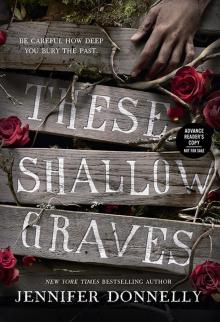- Home
- Jennifer Donnelly
Stepsister
Stepsister Read online
To everyone who’s ever felt
that they’re not enough
Title Page
Dedication
Epigraph
Prologue
One
Two
Three
Four
Five
Six
Seven
Eight
Nine
Ten
Eleven
Twelve
Thirteen
Fourteen
Fifteen
Sixteen
Seventeen
Eighteen
Nineteen
Twenty
Twenty-One
Twenty-Two
Twenty-Three
Twenty-Four
Twenty-Five
Twenty-Six
Twenty-Seven
Twenty-Eight
Twenty-Nine
Thirty
Thirty-One
Thirty-Two
Thirty-Three
Thirty-Four
Thirty-Five
Thirty-Six
Thirty-Seven
Thirty-Eight
Thirty-Nine
Forty
Forty-One
Forty-Two
Forty-Three
Forty-Four
Forty-Five
Forty-Six
Forty-Seven
Forty-Eight
Forty-Nine
Fifty
Fifty-One
Fifty-Two
Fifty-Three
Fifty-Four
Fifty-Five
Fifty-Six
Fifty-Seven
Fifty-Eight
Fifty-Nine
Sixty
Sixty-One
Sixty-Two
Sixty-Three
Sixty-Four
Sixty-Five
Sixty-Six
Sixty-Seven
Sixty-Eight
Sixty-Nine
Seventy
Seventy-One
Seventy-Two
Seventy-Three
Seventy-Four
Seventy-Five
Seventy-Six
Seventy-Seven
Seventy-Eight
Seventy-Nine
Eighty
Eighty-One
Eighty-Two
Eighty-Three
Eighty-Four
Eighty-Five
Eighty-Six
Eighty-Seven
Eighty-Eight
Eighty-Nine
Ninety
Ninety-One
Ninety-Two
Ninety-Three
Ninety-Four
Ninety-Five
Ninety-Six
Ninety-Seven
Ninety-Eight
Ninety-Nine
One Hundred
One Hundred One
One Hundred Two
One Hundred Three
One Hundred Four
One Hundred Five
One Hundred Six
One Hundred Seven
One Hundred Eight
One Hundred Nine
One Hundred Ten
One Hundred Eleven
One Hundred Twelve
One Hundred Thirteen
One Hundred Fourteen
One Hundred Fifteen
One Hundred Sixteen
One Hundred Seventeen
One Hundred Eighteen
One Hundred Nineteen
One Hundred Twenty
One Hundred Twenty-One
One Hundred Twenty-Two
One Hundred Twenty-Three
One Hundred Twenty-Four
One Hundred Twenty-Five
One Hundred Twenty-Six
One Hundred Twenty-Seven
One Hundred Twenty-Eight
One Hundred Twenty-Nine
Epilogue
Acknowledgments
About the Author
Copyright
This is a dark tale. A grim tale.
It’s a tale from another time, a time when wolves waited for girls in the forest, beasts paced the halls of cursed castles, and witches lurked in gingerbread houses with sugar-kissed roofs.
That time is long gone.
But the wolves are still here and twice as clever. The beasts remain. And death still hides in a dusting of white.
It’s grim for any girl who loses her way.
Grimmer still for a girl who loses herself.
Know that it’s dangerous to stray from the path.
But it’s far more dangerous not to.
Once upon always and never again, in an ancient city by the sea, three sisters worked by candlelight.
The first was a maiden. Her hair, long and loose, was the color of the morning sun. She wore a gown of white and a necklace of pearls. In her slender hands, she held a golden scissors, which she used to cut lengths of the finest parchment.
The second, a mother, ample and strong, wore a gown of crimson. Rubies circled her neck. Her red hair, as fiery as a summer sunset, was gathered into a braid. She held a silver compass.
The third was a crone, crookbacked and shrewd. Her gown was black; her only adornment was a ring of obsidian, incised with a skull. She wore her snow-white hair in a coil. Her gnarled, ink-stained fingers held a quill.
The crone’s eyes, like those of her sisters, were a forbidding gray, as cold and pitiless as the sea.
At a sudden clap of thunder, she raised her gaze from the long wooden worktable at which she sat to the open doors of her balcony. A storm howled down upon the city. Rain scoured the rooftops of its grand palazzos. Lightning split the night. From every church tower, bells tolled a warning.
“The water is rising,” she said. “The city will flood.”
“We are high above the water. It cannot touch us. It cannot stop us,” said the mother.
“Nothing can stop us,” said the maiden.
The crone’s eyes narrowed. “He can.”
“The servants are watchful,” said the mother. “He will not get in.”
“Perhaps he already has,” said the crone.
At this, the mother and the maiden looked up. Their wary eyes darted around the cavernous room, but they saw no intruder, only their cloaked and hooded servants going about their tasks. Relieved, they returned to their work, but the crone remained watchful.
Mapmaking was the sisters’ trade, but no one ever came to buy their maps, for they could not be had at any price.
Each was exquisitely drawn, using feathers from a black swan.
Each was sumptuously colored with inks mixed from indigo, gold, ground pearl, and other things—things far more difficult to procure.
Each used time as its unit of measure, not distance, for each map charted the course of a human life.
“Roses, rum, and ruin,” the crone muttered, sniffing the air. “Can you not smell them? Smell him?”
“It’s only the wind,” soothed the mother. “It carries the scents of the city.”
Still muttering, the crone dipped her quill into an inkpot. Tapers flickered in silver candelabra as she drew the landscape of a life. A raven, coal black and bright-eyed, roosted on the mantel. A tall clock in an ebony case stood against one wall. Its pendulum, a human skull, swung slowly back and forth, ticking away seconds, hours, years, lives.
The room was shaped like a spider. The sisters’ workspace, in the center, was the creature’s body. Long rows of towering shelves led off the center like a spider’s many legs. Glass doors that led out to the balcony were at one end of the room; a pair of carved wooden doors loomed at the other.
The crone finished her map. She held a stick of red sealing wax in a candle flame, dripped it onto the bottom of the document, then pressed her ring into it. When the seal had hardened, she rolle
d the map, tied it with a black ribbon, and handed it to a servant. He disappeared down one of the rows to shelve the map, carrying a candle to light his way.
That’s when it happened.
Another servant, his head down, walked between the crone and the open balcony doors behind her. As he did, a gust of wind blew over him, filling the room with the rich scent of smoke and spices. The crone’s nostrils flared. She whirled around.
“You there!” she cried, lunging at him. Her clawlike hand caught hold of his hood. It fell from his head, revealing a young man with amber eyes, dark skin, and long black braids. “Seize him!” she hissed.
A dozen servants rushed at the man, but as they closed in, another gust blew out the candles. By the time they had slammed the doors shut and relit the candles, all that remained of the man was his cloak, cast off and puddled on the floor.
The crone paced back and forth, shouting at the servants. They poured down the dusky rows, their cloaks flying behind them, trying to flush the intruder out. A moment later, he burst out from behind one of the shelves, skidding to a stop a few feet from the crone. He darted to the wooden doors and frantically tried the handle, but it was locked. Swearing under his breath, he turned to the three sisters, flashed a quicksilver smile, and swept them a bow.
He was dressed in a sky-blue frock coat, leather britches, and tall boots. A gold ring dangled from one ear; a cutlass hung from his hip. His face was as beautiful as daybreak, his smile as bewitching as midnight. His eyes promised the world, and everything in it.
But the sisters were unmoved by his beauty. One by one, they spoke.
“Luck,” hissed the maiden.
“Risk,” the mother spat.
“Hazard,” snarled the crone.
“I prefer Chance. It has a nicer ring,” the man said, with a wink.
“It’s been a long time since you paid us a visit,” said the crone.
“I should drop by more often,” said Chance. “It’s always a pleasure to visit the Fates. You’re so spontaneous, so wild and unpredictable. It’s always a party, this place. A regular bacchanal. It’s so. Much. Fun.”
A handful of servants spilled out from between the shelves, red-faced and winded. Chance pulled his cutlass from its scabbard. The blade glinted in the candlelight. The servants stepped back.
“Whose map have you stolen this time?” the crone asked. “What empress or general has begged your favor?”
Still holding his cutlass in one hand, Chance drew a map from his coat with the other. He tugged the ribbon off with his teeth, then gave the parchment a shake. It unrolled, and he held it up. As the three women stared at it, their expressions changed from anger to confusion.
“I see a house, the Maison Douleur, in the village of Saint-Michel,” the crone said.
“It’s the home of—” said the matron.
“A girl. Isabelle de la Paumé,” the crone finished.
“Who?” asked the maiden.
“All this trouble for a mere girl?” asked the crone, regarding Chance closely. “She’s nothing, a nobody. She possesses neither beauty nor wit. She’s selfish. Mean. Why her?”
“Because I can’t resist a challenge,” Chance replied. He rerolled the map with one hand, steadying it against his chest, then tucked it back inside his coat. “And what girl wouldn’t choose what I offer?” He gestured at himself, as if even he couldn’t believe how irresistible he was. “I’ll give her the chance to change the path she is on. The chance to make her own path.”
“Fool,” said the crone. “You understand nothing of mortals. We Fates map out their lives because they wish it. Mortals do not like uncertainty. They do not like change. Change is frightening. Change is painful.”
“Change is a kiss in the dark. A rose in the snow. A wild road on a windy night,” Chance countered.
“Monsters live in the dark. Roses die in the snow. Girls get lost on wild roads,” the crone shot back.
But Chance would not be discouraged. He sheathed his cutlass and held out his hand. As if by magic, a gold coin appeared in his fingers. “I’ll make you a bet,” he said.
“You push me too far,” the crone growled, fury gathering like a storm in her eyes.
Chance flipped the coin at the crone. She snatched it from the air and slammed it down on the table.
The storm broke.
“Do you think a coin can pay for what you’ve set loose?” she raged. “A warlord rampages across France. Death reaps a harvest of bones. A kingdom totters. All because of you!”
Chance’s smile slipped. For a few seconds, his fiery bravado dimmed. “I’ll fix it. I swear it.”
“With that girl’s map?”
“She was brave once. She was good.”
“Your head is even emptier than your promises,” the crone said. “Open the map again. Read it this time. See what becomes of her.”
Chance did so. His eyes followed the girl’s path across the parchment. The breath went out of him as he saw its end … the blotches and hatches, the violent lines. His eyes sought the crone’s. “This ending … It’s not … It can’t be—”
“Do you still think you can fix this?” the crone mocked.
Chance took a step toward her, his chin raised. “I offer you high stakes. If I lose this wager, I will never come to the palazzo again.”
“And if I lose?”
“You allow me to keep this map. Allow the girl to direct her own steps forevermore.”
“I do not like those stakes,” the crone said. She waved her hand, and her servants, who had been slowly edging closer to Chance, charged at him. Some were bearing cutlasses of their own now. Chance was trapped. Or so it seemed.
“There’s no hope of escape. Give me back the map,” said the crone, holding out her hand.
“There’s always hope,” Chance said, tucking the map back into his coat. He took a few running steps, launched himself into a flip, and flew over the heads of the servants. He landed on the worktable with the grace of a panther and ran down its length. When he reached the end, he jumped to the floor, then sped to the balcony.
“You are caught now, rogue!” the crone shouted after him. “We are three stories high! What can you do? Leap across the canal? Even you are not that lucky!”
Chance wrenched open the balcony’s doors and leapt up onto its railing. The rain had stopped, but the marble was still wet and slippery. His body pitched back and forth. His arms windmilled. Just as it looked as if he would surely fall, he managed to steady himself, balancing gingerly on his toes.
“The map. Now,” the crone demanded. She had walked out onto the balcony and was only a few feet away from him. Her sisters joined her.
Chance glanced back at the Fates; then he somersaulted into the air. The crone gasped. She rushed to the railing, her sisters right behind her, expecting to see him drowning in the swirling waters below.
But he was not. He was lying on his back, cradled in the canopy of a gondola. The boat was rocking violently from side to side, but Chance was fine.
“Row, my fine fellow!” he called to the gondolier. The man obliged. The boat moved off.
Chance sat up, eyeing the Fates with a diamond-bright intensity. “You must accept my stakes now! You have no choice!” he shouted.
The gondola grew smaller and smaller as it made its way down the canal. A moment later, it rounded a bend and disappeared.
“This is a bad state of affairs,” the crone said darkly. “We cannot have mortals making their own choices. When they do, disaster follows.”
The maiden and the mother stepped back into the room. The crone trailed them. “Pack a trunk,” she barked at a servant. “I’ll need quills and inks …” Her hand hovered over the bottles upon the table. She selected a deep ebony. “Fear, yes. Jealousy will be useful, too,” she said, reaching for a poisonous green.
“Where are you going?” the maiden asked.
“To the village of Saint-Michel,” the crone replied.
“You will stop
Chance from taking hold of the girl?” asked the mother.
The crone smiled grimly. “No, I cannot. But I will do what we Fates have always done. I will stop the girl from taking hold of a chance.”
In the kitchen of a grand mansion, a girl sat clutching a knife.
Her name was Isabelle. She was not pretty.
She held the knife’s blade over the flames of a fire burning in the hearth. Behind her, sprawled half-conscious in another chair, was her sister, Octavia.
Octavia’s face was deathly pale. Her eyes were closed. The once-white stocking covering her right foot was crimson with blood. Adélie, the sisters’ old nursemaid, peeled it off and gasped. Octavia’s heel was gone. Blood dripped from the ugly wound where it used to be and pooled on the floor. Though she tried to hold it in, a moan of pain escaped her.
“Hush, Tavi!” Maman scolded. “The prince will hear you! Just because your chances are ruined doesn’t mean your sister’s must be.”
Maman was the girls’ mother. She was standing by the sink, rinsing blood out of a glass slipper.
The prince had come searching for the one who’d worn it. He’d danced all night with a beautiful girl at a masquerade ball three days ago and had fallen in love with her, but at the stroke of midnight, the girl had run away, leaving only a glass slipper behind. He would marry the girl who’d worn it, he’d vowed. Her and no other.
Maman was determined that one of her daughters would be that girl. She’d greeted the royal party in the foyer and requested that Isabelle and Octavia be allowed to try the slipper on in privacy, in deference to their maidenly modesty. The prince had agreed. The grand duke had held out a velvet pillow. Maman had carefully lifted the slipper off it and carried it into the kitchen. Her daughters had followed her.
“We should’ve heated the blade for Tavi,” Maman fretted now. “Why didn’t I think of it? Heat sears the vessels. It stops the bleeding. Ah, well. It will go better for you, Isabelle.”
Isabelle swallowed. “But, Maman, how will I walk?” she asked in a small voice.
“Silly girl! You will ride. In a golden carriage. Servants will lift you in and out.”
Flames licked the silver blade. It grew red. Isabelle’s eyes grew large with fear. She thought of a stallion, lost to her now, that she had once loved.
“But, Maman, how will I gallop through the forest?”
“The time has come to put childish pursuits aside,” Maman said, drying the slipper. “I’ve bankrupted myself trying to attract suitors for you and your sister. Pretty gowns and fine jewels cost a fortune. A girl’s only hope in life is to make a good marriage, and there’s no finer match than the prince of France.”

 Rogue Wave
Rogue Wave Waterfire Saga, Book One: Deep Blue (A Waterfire Saga Novel)
Waterfire Saga, Book One: Deep Blue (A Waterfire Saga Novel) Revolution
Revolution The Wild Rose
The Wild Rose Waterfire Saga (4 Book Series)
Waterfire Saga (4 Book Series) These Shallow Graves
These Shallow Graves Beauty and the Beast: Lost in a Book
Beauty and the Beast: Lost in a Book A Northern Light
A Northern Light The Tea Rose
The Tea Rose Waterfire Saga, Book Three: Dark Tide: A Deep Blue Novel
Waterfire Saga, Book Three: Dark Tide: A Deep Blue Novel The Winter Rose
The Winter Rose A Gathering Light
A Gathering Light Stepsister
Stepsister Waterfire Saga, Book Four: Sea Spell: Deep Blue Novel, A
Waterfire Saga, Book Four: Sea Spell: Deep Blue Novel, A Northern Light
Northern Light Winter Rose, The
Winter Rose, The